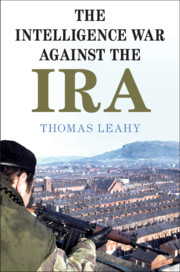Book contents
- The Intelligence War against the IRA
- The Intelligence War against the IRA
- Copyright page
- Dedication
- Contents
- Acknowledgements
- Abbreviations
- Introduction
- Part I The Intelligence War: August 1969 to July 1972
- Part II On the Verge of Defeat? The Intelligence War: July 1972 to December 1975
- Part III The Struggle to Contain the IRA: January 1976 to April 1998
- 7 British Political, Military and Intelligence Strategy towards the IRA: 1976–1998
- 8 The Intelligence War against the IRA in Belfast and Derry City, January 1976 to August 1994
- 9 The Intelligence War against the IRA in Rural Areas and England and the IRA Leadership, January 1976 to August 1994
- 10 ‘It’s the Primacy of Politics That’s Important’: Alternative Reasons for the IRA’s Ceasefires in August 1994 and July 1997
- Conclusion
- Book part
- Notes
- Bibliography
- Index
7 - British Political, Military and Intelligence Strategy towards the IRA: 1976–1998
from Part III - The Struggle to Contain the IRA: January 1976 to April 1998
Published online by Cambridge University Press: 05 March 2020
- The Intelligence War against the IRA
- The Intelligence War against the IRA
- Copyright page
- Dedication
- Contents
- Acknowledgements
- Abbreviations
- Introduction
- Part I The Intelligence War: August 1969 to July 1972
- Part II On the Verge of Defeat? The Intelligence War: July 1972 to December 1975
- Part III The Struggle to Contain the IRA: January 1976 to April 1998
- 7 British Political, Military and Intelligence Strategy towards the IRA: 1976–1998
- 8 The Intelligence War against the IRA in Belfast and Derry City, January 1976 to August 1994
- 9 The Intelligence War against the IRA in Rural Areas and England and the IRA Leadership, January 1976 to August 1994
- 10 ‘It’s the Primacy of Politics That’s Important’: Alternative Reasons for the IRA’s Ceasefires in August 1994 and July 1997
- Conclusion
- Book part
- Notes
- Bibliography
- Index
Summary
After 1975, British policymakers no longer believed that the IRA would settle for a political compromise. Instead, the British government sought to reduce IRA activity to a level at which it would not interfere with potential political agreements between constitutional nationalists and unionists. Continuing IRA activity convinced the Thatcher government to continue this strategy towards Irish republicans. The aim of enticing Irish republicans to fully politicise via backchannel negotiations would only be readopted under Peter Brooke in 1990. In order to force republicans to promptly agree to a political compromise, John Major’s government followed a similar strategy to that of Harold Wilson’s government between 1974 and 1975. There would be a combination of backchannel conversations alongside a continuing intelligence campaign to erode the IRA’s armed capacity. This chapter also outlines how the IRA and Sinn Féin leadership privately only sought a return to talks after 1975. They sought to persist with the IRA’s campaign and to maximise Sinn Féin’s share of the vote in order to get the British government to return to talks and provide concessions towards Irish republican objectives.
- Type
- Chapter
- Information
- The Intelligence War against the IRA , pp. 121 - 137Publisher: Cambridge University PressPrint publication year: 2020

